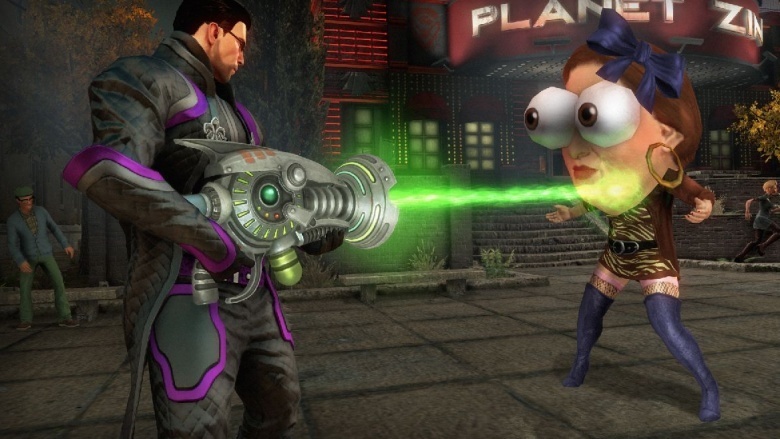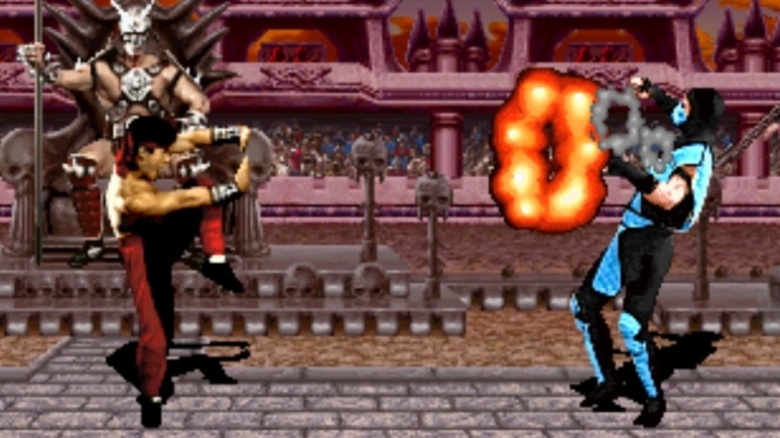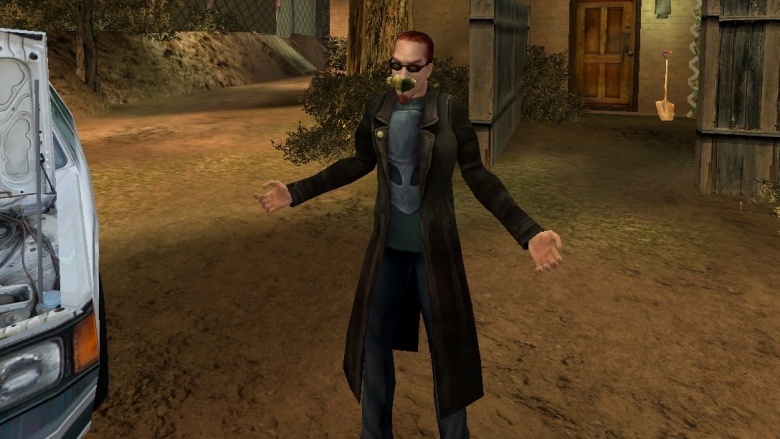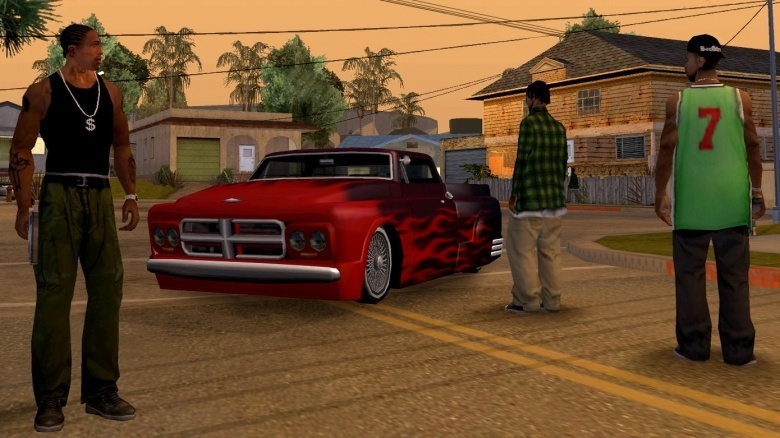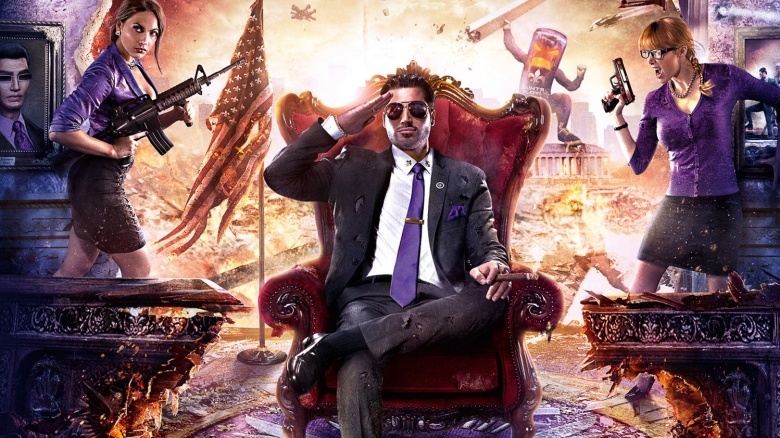Controversial Games That Were Almost Banned
There's something about the very medium of video games that gets the world's moral watchdogs all in a tizzy. Maybe it's the fact that so many early games were aimed squarely at kids and teenagers, or maybe it's the fact that game-playing is so interactive and immersive. Whatever it is, you can reliably multiply people's outrage by a million whenever something truly controversial shows up on-screen. Here are a few games so provocative, they were almost banned (and, in some countries, actually were).
Mortal Kombat (1992)
Back in 1992, a fighting game featuring digitized actors, buckets of blood, and insanely violent "Fatalities" created a frenzy in arcades—and in the media. Mortal Kombat spurred the United States Senate to hold hearings on the impact of video game violence on children and society, and the game's home console release a year later stirred up even more trouble. The Sega Genesis version retained the gore of its arcade cousin, while Super NES-owners had to make do with a port that replaced Mortal Kombat's signature blood with a mysteriously white liquid that we can only guess was meant to be sweat...or barf?
The Mortal Kombat franchise has spawned countless sequels, cartoons, comics, and even movies. But perhaps its greatest legacy is the creation of the Entertainment Software Rating Board, or ESRB, a game industry-made regulatory board that decides whether a game is E for Everyone, or M for Mature.
Perhaps to atone for its sins, Mortal Kombat developer Midway Games added some new finishing moves—"Friendships" and "Babalities"—to its sequel. Now, instead of ripping out someone's spine, you can just turn him into a baby!
BMX XXX (2002)
In the late-1990s and early-2000s, a new category of games based on extreme sports tore up the sales charts, all starting with Tony Hawk's Pro Skater. It didn't take long for imitators to start flooding store shelves, including pro BMX biker Dave Mirra. Dave Mirra's Freestyle BMX did okay when it launched in 2000, but development on the follow-up title was, apparently, not going so well.
To mitigate what was going to be a lousy second effort, publisher Acclaim ordered the game's developer, Z-Axis, to include sex jokes, strippers, naked ladies—you know, all the classic trappings of a BMX biking video game. When Mirra found out about the game's direction, he took his name off the project and sued Acclaim.
Meanwhile, when the company released the Mirra-less game, which featured the almost-but-kinda-not-funny title BMX XXX, it was, of course, immediately met with outrage. Stores across the United States, including Walmart and Toys R Us, refused to stock it, while the adult content was censored in the PlayStation 2 version. Meanwhile, all of the adult content was removed for its Australia release. And of course, since the main reason Acclaim added in the lewdness was that the game was a piece of junk anyway, its sales were abysmal. Needless to say, there has yet to be a BMX XXXX.
Postal 2 (2003)
Named for the unfortunate stereotype of postal workers going bananas and shooting people, the two games in the Postal franchise were never going to win awards for good taste or subtlety. Taking the role of the appropriately named "Postal Dude," players receive a series of tasks to perform before the end of the in-game week—and they're presented with an ever-present arsenal of weapons lying at their feet for the taking. A sample of the kinds of shenanigans found in the game: escalating shoot-outs with townsfolk, setting elephants on fire, and literally using cats as gun silencers. It's gross.
While the game's developer, Running With Scissors, liked to claim that Postal 2's violence was at the discretion of the player, that didn't stop countries the world over from taking offense at its content. Specifically, countries including Australia, New Zealand, Malaysia, Germany, and Sweden banned the game's sale due to reasons like "gross abhorrent content" and "very high impact violence" and "offensive depictions of cruelty."
But really, the game's biggest crime is laziness. Calling the lead character "Postal Dude"? Come on, you can do better than that.
Grand Theft Auto: San Andreas (2004)
The 2004 release of Grand Theft Auto: San Andreas for consoles and PC would have stirred plenty of controversy all on its own for its depictions of crime and wanton destruction and violence. But in 2005, modders discovered some disabled code within San Andreas for a mini-game depicting the game's protagonist while enjoying "intimate relations" with his girlfriend. Nicknamed "Hot Coffee," the mini-game could be found inside PC and home console versions of the game, though it was completely inaccessible unless a user hacked his or her way inside.
Regardless of how well developer Rockstar Games had hidden "Hot Coffee," the discovery made headlines and spurred the ESRB to re-classify the game from Mature to Adults Only 18+. Rockstar recalled the software from stores, and "Hot Coffee" was poured down the digital drain—but there was plenty of damage done. Legislators tried to pass a law for the federal government to enforce ESRB ratings, while Rockstar and the game's publisher, Take-Two Interactive, were hit with civil lawsuits and a suit from the Federal Trade Commission—both of which were settled. Just goes to show you: sometimes hot coffee is a bit too hot.
Saints Row IV (2013)
Take every possibly offensive aspect of the Grand Theft Auto series, then multiply it by about a hundred. That's basically the premise behind the Saints Row franchise. We'd like to list some of what goes on in the game series, but rather than try and bend over backwards to avoid graphic descriptions, you're probably just better off Googling it. Just make sure your mom isn't in the room.
With the fourth entry in the franchise, developer Volition gave players the chance to take the role of the President of the United States—albeit, a president with a nasty drug and alcohol problem, not to mention a proclivity towards sex and violence. Once perverted space aliens and certain kinds of examination procedures got involved in the game's plot, the Australian Classification Board banned the game outright. Even worse, apparently, the Board took major issue with the fact that the game gave players power-ups in the forms of various kinds of "alien narcotics."
When Saints Row IV's publisher, Deep Silver, removed the offending content from the Australian version of the game, it boomeranged its way back onto Aussie shelves quicker than you can say "Vegemite." Ironically, Australia still has yet to ban the sale of Vegemite, despite its offenses against the entire human race.

